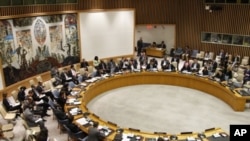Western nations on Wednesday warned that they will not let up their pressure on Iran to comply with international demands that it suspend its nuclear enrichment activities and answer questions about its disputed atomic program.
Speaking at the regular briefing of the Security Council’s Iran sanctions committee, French Chargé d’Affaires Martin Briens said questions about the nature of Iran’s nuclear ambitions remain a top concern. He is heard here through a translator.
“The eyes of the international community are currently diverted elsewhere, focusing on Syria, Libya - and Iran may believe that it can profit from this situation," said Briens. "It has increased the number of centrifuges and provocative statements, but we are not misled by this.”
France’s envoy said Iran’s military-oriented nuclear ambitions pose a “growing and constant threat” and noted Tehran’s June launch of a satellite using ballistic missile technology that is prohibited under a U.N. Security Council resolution as yet another violation of international demands.
For the past nine years, Iran has failed to provide the U.N.’s International Atomic Energy Agency, or IAEA, with the requested guarantees that its program is strictly civilian in nature.
U.S. Ambassador Susan Rice said the agency’s latest report, released last week, underscored Iran’s continued lack of cooperation.
“Iran refuses to address outstanding issues related to its nuclear program," she said. "The Director General reports that Iran is continuing enrichment and heavy water-related activities in defiance of both this council and the IAEA Board of Governors. Iran still refuses to respond substantively to information regarding possible military dimensions to Iran's nuclear program.”
Ambassador Rice told reporters that the United States remains “very focused” on preventing Iran from acquiring a nuclear weapon.
Western diplomats, along with those from Russia and China, have pursued a two-track strategy of engagement and pressure with Iran.
German Ambassador Peter Wittig said that will continue as a way to get Iran to the negotiating table. “We continue to be ready to engage Iran in meaningful negotiations about its nuclear program in the framework of the engagement track," he said. "This is our preferred choice. However, as long as Iran does not cooperate to the extent necessary, we see no other option but to pursue the pressure track.”
Other delegations, including those from Russia, China and India, urged dialogue to improve confidence and mutual trust. But they also advised Iran to dispel any lingering questions about the nature of its nuclear program.
The U.N. Security Council has imposed four sets of sanctions against Iran for its atomic activities, but Tehran says its nuclear ambitions are peaceful.
West Keeps up Pressure on Iran’s Nuclear Program




